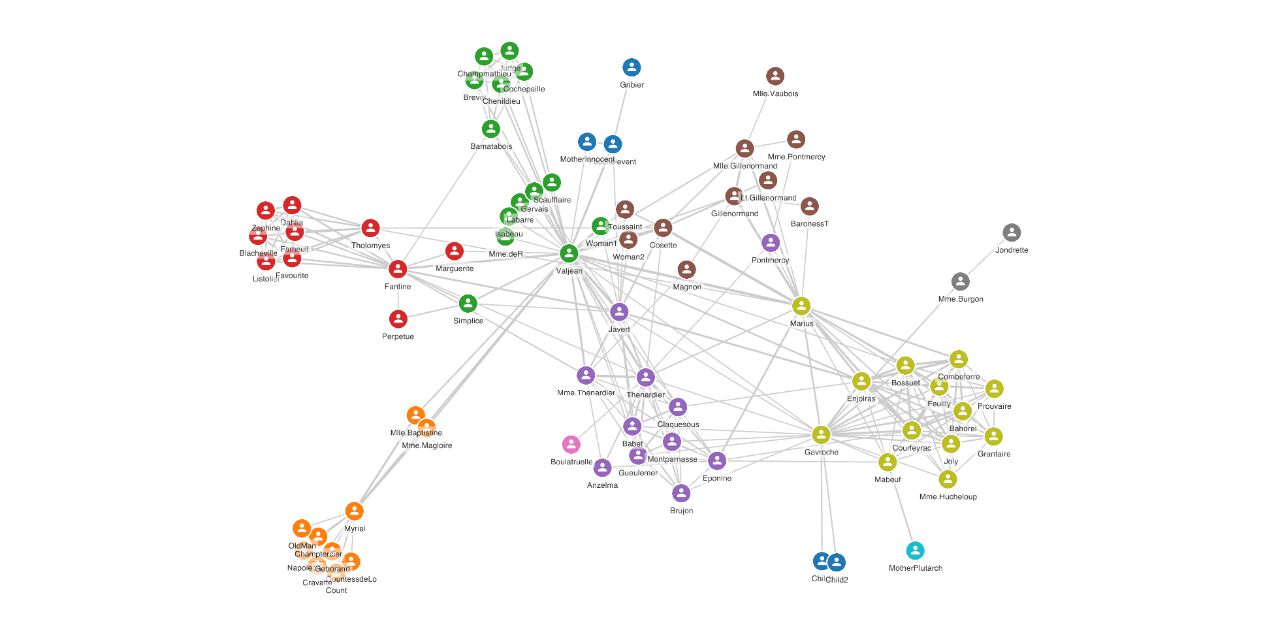pixi-graph
Graph visualization library using PIXI.js and Graphology.
Developing a full-featured graph visualization library is a significant effort. I'd appreciate your feedback to prioritize new features by filling in a survey.
Install
npm install graphology pixi-graph
or
<script src="https://unpkg.com/graphology@0.18.0/dist/graphology.umd.js"></script>
<script src="https://unpkg.com/pixi-graph@1.3.1/dist/pixi-graph.umd.min.js"></script>Usage
Basic
const graph = new graphology.Graph();
// populate Graphology graph with data
// assign layout positions as `x`, `y` node attributes
const pixiGraph = new PixiGraph.PixiGraph({
container: document.getElementById('graph'),
graph
});Layouts
In its simplicity, a graph layout is a function nodes => positions. Therefore a layout from any other library can be used. Run the layout separately, and assign layout positions as x, y node attributes.
graphology-layout-forceatlas2 example:
const graph = new graphology.Graph();
// populate Graphology graph with data
graph.forEachNode(node => {
graph.setNodeAttribute(node, 'x', Math.random());
graph.setNodeAttribute(node, 'y', Math.random());
});
forceAtlas2.assign(graph, { iterations: 300, settings: { ...forceAtlas2.inferSettings(graph), scalingRatio: 80 }});
const pixiGraph = new PixiGraph.PixiGraph({ ..., graph });Style
const style = {
node: {
color: '#000000',
},
edge: {
color: '#000000',
},
};
const pixiGraph = new PixiGraph.PixiGraph({ ..., style });Colors
Colors are resolved with color-rgba. The following CSS colors strings are supported: named colors, hex, short-hand hex, RGB, RGBA, HSL, HSLA.
Webfonts
Preload fonts before creating PixiGraph with FontFaceObserver.
Material Icons example:
<link href="https://fonts.googleapis.com/icon?family=Material+Icons" rel="stylesheet">const style = {
node: {
icon: {
content: 'person',
fontFamily: 'Material Icons',
},
},
};
await new FontFaceObserver('Material Icons').load();
const pixiGraph = new PixiGraph.PixiGraph({ ..., style });Bitmap fonts
Register bitmap fonts as resource-loader external resource.
const style = {
node: {
label: {
content: node => node.id,
type: PixiGraph.TextType.BITMAP_TEXT,
fontFamily: 'HelveticaRegular',
},
},
};
const resources = [
{ name: 'HelveticaRegular', url: 'https://gist.githubusercontent.com/zakjan/b61c0a26d297edf0c09a066712680f37/raw/8cdda3c21ba3668c3dd022efac6d7f740c9f1e18/HelveticaRegular.fnt' },
];
const pixiGraph = new PixiGraph.PixiGraph({ ..., style, resources });Hover style
Hover style values override style values when node/edge is hovered.
const style = {
node: {
color: '#000000',
},
edge: {
color: '#000000',
},
};
const hoverStyle = {
node: {
color: '#ff0000',
},
edge: {
color: '#ff0000',
},
};
const pixiGraph = new PixiGraph.PixiGraph({ ..., style, hoverStyle });API
export interface GraphOptions<NodeAttributes extends BaseNodeAttributes = BaseNodeAttributes, EdgeAttributes extends BaseEdgeAttributes = BaseEdgeAttributes> {
container: HTMLElement;
graph: AbstractGraph<NodeAttributes, EdgeAttributes>;
style: GraphStyleDefinition<NodeAttributes, EdgeAttributes>;
hoverStyle: GraphStyleDefinition<NodeAttributes, EdgeAttributes>;
resources?: IAddOptions[];
}
export class PixiGraph<NodeAttributes extends BaseNodeAttributes = BaseNodeAttributes, EdgeAttributes extends BaseEdgeAttributes = BaseEdgeAttributes> {
constructor(options: GraphOptions<NodeAttributes, EdgeAttributes>);
}-
container- HTML element to use as a container -
graph- Graphology graph -
style- style definition -
hoverStyle- additional style definition for hover state-
⚠️ subject to change with the implementation of other states
-
-
resources- resource-loader external resource definitions- resources are passed to loader.add function
- currently used only for external bitmap fonts
Style definition
GraphStyle interface represents a resolved style, all values are mandatory.
GraphStyleDefinition interface allows functions or missing values at any key. Functions are resolved, missing values fall back to a previous definition, or default values.
export interface GraphStyle {
node: {
size: number;
color: string;
border: {
width: number;
color: string;
};
icon: {
content: string;
type: TextType;
fontFamily: string;
fontSize: number;
color: string;
};
label: {
content: string;
type: TextType;
fontFamily: string;
fontSize: number;
color: string;
backgroundColor: string;
padding: number;
};
};
edge: {
width: number;
color: string;
};
}
export type NodeStyle = GraphStyle['node'];
export type EdgeStyle = GraphStyle['edge'];
export type StyleDefinition<Style, Attributes> =
((attributes: Attributes) => Style) |
{[Key in keyof Style]?: StyleDefinition<Style[Key], Attributes>} |
Style;
export interface GraphStyleDefinition<NodeAttributes extends BaseNodeAttributes = BaseNodeAttributes, EdgeAttributes extends BaseEdgeAttributes = BaseEdgeAttributes> {
node?: StyleDefinition<NodeStyle, NodeAttributes>;
edge?: StyleDefinition<EdgeStyle, EdgeAttributes>;
}This allows either static styles, or data-driven styles at any style definition level. Each function is resolved only once.
const style = {
node: {
color: '#000000',
},
};or
const style = {
node: {
color: node => colors[node.group % colors.length],
},
};or
const style = {
node: node => {
const color = colors[node.group % colors.length];
return { color };
},
};Events
Node events:
- nodeClick
- nodeMousemove
- nodeMouseover
- nodeMouseout
- nodeMousedown
- nodeMouseup
pixiGraph.on('nodeClick', (event, nodeKey) => ...);Edge events:
- edgeClick
- edgeMousemove
- edgeMouseover
- edgeMouseout
- edgeMousedown
- edgeMouseup
pixiGraph.on('edgeClick', (event, edgeKey) => ...);



